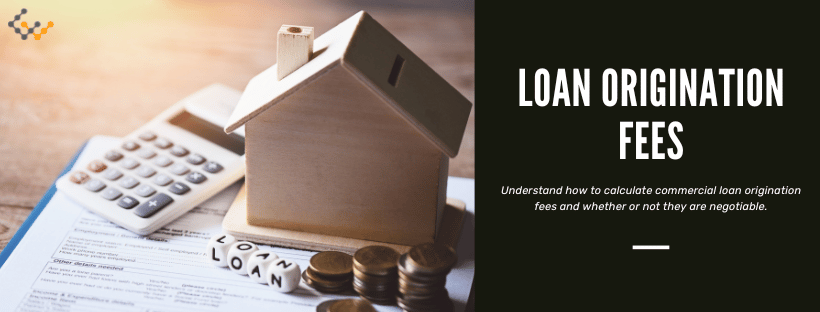Are Commercial Loan Origination Fees Negotiable?

Lenders charge a variety of fees when underwriting commercial real estate loans. One of the most common commercial loan fees and charges is the loan origination fee.
What Are Loan Origination Fees?
Loan origination fees are charged to cover the overhead associated with actually originating a loan.
Origination encompasses the entire process of entering into a loan agreement, from initial application to final signing. The lender must pay all bankers, underwriters, and even administrative assistants who are involved. Even the person who schedules an appraisal needs to be paid. These labor costs are the bulk of what origination fees pay for.
The vast majority of commercial real estate loans have a mortgage origination fee, because there’s substantial work required to originate such sizeable loans. The fee is listed as a single item on the loan estimate and closing disclosure.
How Are Commercial Loan Origination Fees Calculated?
Commercial loan origination fees are assessed as a percentage of the loan. They’re normally 0.5 – 1% of the loan balance. Keep in mind that this is a percent of the amount borrowed, and not of the total purchase price of a property. (Origination fees used to be higher in the 1990s and 2000s, but legislation and public pressure post-2008 have curtailed them.)
For example, let’s explore how to calculate the loan origination fee for financing a $1 million property. If the loan program allows for an 80% loan-to-value ratio, then the amount borrowed could be $800,000. A loan origination fee on this size loan would likely be $40,000 to $80,000.
In some cases, loan origination fees might be outside the normative range when financing very inexpensive or very expensive properties. The amount charged can become disconnected from the overhead that these pay for when borrowing at either extreme, as the amount of work required to originate a loan doesn’t change much with the loan amount. Lenders may thus have a minimum or maximum that they’ll assess.
Whatever amount is assessed, it’s paid at closing and stated beforehand. It might be listed as a “loan origination fees,” “commercial loan origination fees,” “mortgage origination fees” or something similar.
Where Do Loan Origination Fees Go?
Loan origination fees are used to pay the personnel that facilitate the loan process. This includes the loan officer, underwriter(s) and banker(s) involved, as well as their support staff. Anyone who reviews a paper, prepares a form, schedules a meeting, or follows up in some way is likely paid from the origination fee.
Answer a few questions and get custom mortgage quotes. We'll match you with offers from our network of 650+ lenders.
Are Commercial Loan Origination Fees Negotiable?
Commercial loan origination fees are some of the most negotiable fees that lenders charge, as there’s no requirement for them. Some lenders even offer loans without any origination fees.
Before electing to negotiate on the fee, however, it’s first important to understand how commercial loan origination fees and commercial property loan rates interact.
Loan origination fees and commercial property loan rates have an inverse relationship. Lenders must cover their labor overhead through some charge. They most commonly use a loan origination fee, but a higher interest rate can alternatively provide the finances needed.
Thus, loan origination fees are negotiable at the expense of interest rate. Paying a lower origination fee will inevitably result in a higher interest rate. Some borrowers actually choose a higher origination fee in order to secure a lower interest rate.
Negotiating a loan origination fee doesn’t involve advanced techniques, but is a straightforward process. Lenders will offer a specific interest rate adjustment, in exchange for a specific increase or decrease in the origination fee. The ratio is generally set and not negotiable.
Whether lowering the origination fee or interest rate is preferable depends on the specifics of a situation, and is a determination that the borrower must make. Paying a higher origination fee in order to secure a lower interest rate is colloquially referred to as “buying points.”
Loans Without Origination Fees
Lenders who offer commercial real estate loans that have no origination fees must make up the cost somehow, and they most often do so by charging more interest. Before assuming one of these loans is financially advantageous, the additional interest charges that will be due over the course of the loan must be tabulated. This type of loan may or may not be preferable.
What Are the Differences Between Loan Origination Fees and Other Closing Costs?
Loan origination fees are just one of the many closing costs that commercial real estate loans come with. Some of the most common costs are:
- Origination Fee: Covers labor overhead associated with the loan process. 0.5-1% of the amount borrowed.
- Appraisal Cost: Covers valuing the property and a basic safety check. Flat fee.
- Environmental Report Cost: Covers checking for dangerous contaminants on the property. Flat fee.
- Inspection Cost: Covers checking the property’s condition and integrity. Flat fee.
- Mortgage Broker’s Fee: Covers the broker’s commission when using a broker. 0.50-2% of the amount borrowed.
- Other Costs: Includes miscellaneous charges such as application fee, credit check fee, title insurance, property taxes, etc.
A loan officer can explain all of these fees, but it’s helpful to be informed when initially applying.
Wrapping Things Up
Commercial loan origination charges are one of the many closing costs you can expect to pay when financing a commercial real estate property. Understand that the lender has to cover their labor overhead, but that they might do so through the origination fees or higher interest commercial mortgage rates. You can then negotiate this fee to your best advantage.

